

New dictionary records 4,000 Yorkshire dialect words. Media playback is unsupported on your device More than 4,000 words have been collated in a newly published dictionary of Yorkshire dialect terms.
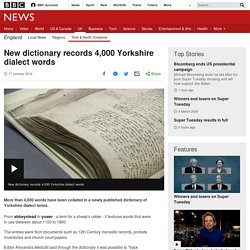
From abbeystead to yower - a term for a sheep's udder - it features words that were in use between about 1100 to 1800. The entries were from documents such as 12th Century monastic records, probate inventories and church court papers. Editor Alexandra Medcalf said through the dictionary it was possible to "track Yorkshire's history through its language use". Work on the Yorkshire Historical Dictionary has taken more than 15 months to finish. The book began life through the work of historian Dr George Redmonds. Ms Medcalf, project archivist at the Borthwick Institute for Archives, at the University of York, said Dr Redmonds spent more than 60 years collecting words on little postcards "When we discovered his collection it was decided it was really too important to just stay in shoeboxes in his office," she said.
Wrangwise - In an incorrect way, wrongly. Sounds Familiar? What you can hear You can listen to 71 sound recordings and over 600 short audio clips chosen from two collections of the British Library Sound Archive: the Survey of English Dialects and the Millennium Memory Bank.
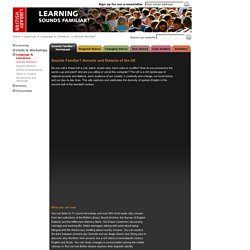
You’ll hear Londoners discussing marriage and working life, Welsh teenagers talking with pride about being bilingual and the Aristocracy chatting about country houses. You can explore the links between present-day Geordie and our Anglo-Saxon and Viking past or discover why Northern Irish accents are a rich blend of seventeenth century English and Scots. You can study changes in pronunciation among the middle classes or find out how British Asians express their linguistic identity. What you can do In addition there are interpretation and learning packages relating to the dual themes of language variation and language change within spoken English. British Accents and Dialects.
Wikimedia The United Kingdom is perhaps the most dialect-obsessed country in the world.
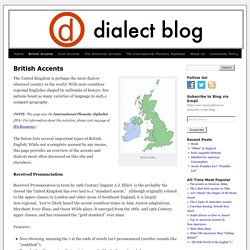
With near-countless regional Englishes shaped by millennia of history, few nations boast as many varieties of language in such a compact geography. (NOTE: This page uses the International Phonetic Alphabet (IPA). For information about this notation, please visit my page of IPA Resources.) The below lists several important types of British English. Received Pronunciation Received Pronunciation (a term by 19th Century linguist A.J. Features: Non-rhoticity, meaning the r at the ends of words isn’t prounounced (mother sounds like “muhthuh”).Trap-bath split, meaning that certain a words, like bath, can’t, and dance are pronounced with the broad-a in father. Speech Samples: Cockney Cockney is probably the second most famous British accent. Estuary English (Southeast British) Estuary is an accent derived from London English which has achieved a status slightly similar to “General American” in the US. Geordie dialect. Geordie: A Regional Dialect of English Most of us have a vague sense of the accents and dialects spoken in different parts of the UK, such as Cockney or Brummie.
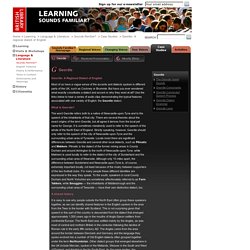
But have you ever wondered what exactly constitutes a dialect and accent or why they exist at all? Use the links below to hear a series of audio clips demonstrating the typical features associated with one variety of English: the Geordie dialect. What is Geordie? The word Geordie refers both to a native of Newcastle-upon-Tyne and to the speech of the inhabitants of that city. A shared history It is easy to see why people outside the North East often group these speakers together, as we can identify shared features in the English spoken in the area from the Tees to the border with Scotland. Echoes from times past Intriguingly, we can still hear echoes of these ancient dialect boundaries in contemporary spoken English. English dialect grammar. English accents. The BATH Map (Variation) Phonological variation — differences between accents — comes in a variety of forms.
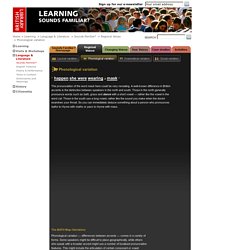
Some speakers might be difficult to place geographically, while others who speak with a broader accent might use a number of localised pronunciation features. This might include the articulation of certain consonant or vowel sounds. It might be apparent in so-called connected speech processes — the way certain sounds are pronounced in particular combinations of words or phrases. Or it might be revealed in characteristic intonation patterns. Terms like Yorkshire accent are often surprising to people who live in Yorkshire, as locals will insist quite rightly that there are several different types of Yorkshire accent. Listen to these extracts of speakers using regionally specific accent features: we used to work with a real wide range of young people and we al, also used to go into pubs and nightclubs and, uhm Show Commentary definite article reduction Rhoticity L-vocalisation See Also.
Accents and dialects. Nwav2015 drummond dray. The UrBEn-ID project. West Midlands English: Speech and Society. Talk of the Toon.